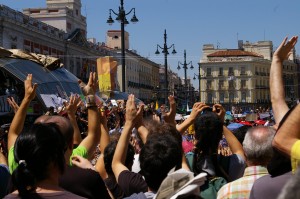
“Our judicial system is not frightening enough ”, said Felip Puig, the Catalan interior chief, a few days after the March 29 general strike. In the wake of that protest, the Spanish government has unveiled a series of changes to the Criminal Code that it hopes will be approved by June and which would criminalise the actions of movements such as 15-M (or indignados), despite their peaceful nature.
Last week, Interior Minister Jorge Fernández gave more details: peaceful resistance will be deemed a form of illegal undermining of authority, punishable with one to three years in jail; the punishment for civil disobedience, which is currently six months to one year in jail, will be increased to two to three years.
There is another change to the Criminal Code that can further hurt the 15-M movement, which relies on social networks as one of its main channels of communication: the convoking, via internet, of actions that involve violence would be now a crime, punishable with two to five years in jail. This would be deemed forming part of a criminal organization, equating cyber activists with members of drug or other criminal gangs, even if they were not involved in the violence that took place in the protest.
The minister also announced the bolstering of the punishment for disorderly conduct, which is now six months to three years in jail. With the reform of the Criminal Code it will mean a minimum of two years in jail (the same as for kale borroka, politically motivated street vandalism in the Basque region). This objective is clear: to clamp down on Spain’s “antisistema” element (ie: anti-system activists), as has already been done in Catalonia, where, since March 29, three young strikers have been on preventive remand.
15-M activists have condemned these planned changes to the Criminal Code. The government’s move implies “the repression of any kind of protest action”, said one activist. “The government does not react to peaceful social movements by listening but by repressing and setting the foundations of a pseudo-fascist state,” says Democracia Real Ya on its Facebook page.
Others outside the 15-M movement have also voiced concern, including members of the justice system. Valencia’s spokesman for Jueces para la Democracia, an association representing more than 500 Spanish judges, warned that the government’s reforms seek to “criminalize demonstrations that are mostly peaceful.”
The repression of the 15-M movement has been particularly harsh in Catalonia, where 20 people are facing three to five years in jail and more than 200 have been handed fines totalling over €40,000 for protest activity. Since May 15, 2011, more than 200 activists have been arrested around Spain, half of them in Barcelona. Mostly, they are charged with civil disobedience, resisting arrest, disorderly conduct and similar offences. The Legal Committee of Sol, which gives legal support to the 15-M movement, reported that in February nine young people were interrogated by hooded police after being arrested during a protest against the labour law reform, receiving treatment similar to that meted out to suspected terrorists.
Next month, 15-M will call for new actions, coinciding with the anniversary of the movement’s emergence. The initiative has been prepared for several months, in Spain and other countries. Meanwhile, the police are carefully monitoring these preparations ahead of the actions themselves. But they have got their work cut out: Democracia Real Ya, just one of the groups associated with the movement, has nearly half a million followers on Facebook and more than 135,000 on Twitter.
Leave a Reply
You must be logged in to post a comment.